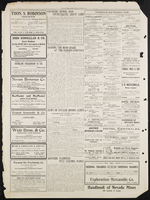Search the Special Collections and Archives Portal
Search Results
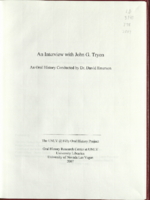
Transcript of interview with John G. Tryon by Dr. David Emerson, February 21, 2006
Date
Archival Collection
Description
Text

Nick Robone oral history interview: transcript
Date
Archival Collection
Description
Oral history interview with Nick Robone conducted by Claytee D. White and Barbara Tabach on December 21, 2017 for the Remembering 1 October Oral History Project. In this interview, Nick Robone, born and raised in Nevada, details his process of healing after being shot during the 2017 Las Vegas mass shooting at the Route 91 Harvest music festival. He discusses the events of that Sunday night and how he has learned to view life in a more positive light. Robone mentions various coping mechanisms that have helped him, including being open about his experience and talking about it with other survivors as well as pursuing his passions.
Text

Transcript of interview with Lee and Dick Igert by Robert Cannata, February 26, 1980
Date
Archival Collection
Description
On February 24, 1980, Robert Cannata interviewed his neighbors, Lee & Dick Igert about their employment agency company. The Igerts discuss the many different job opportunities outside of casino work that are available in Las Vegas, Nevada. The interview concludes with an explanation of how one finds a job in Las Vegas.
Text
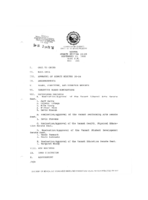
Meeting minutes for Consolidated Student Senate University of Nevada, Las Vegas, September 13, 1990
Date
Archival Collection
Description
Text
Shelley Berkley Papers
Identifier
Abstract
The Shelley Berkley Papers (1987-2012) consist primarily of correspondence and other documents pertaining to Shelley Berkley's tenure as United States Representative for Nevada 1st congressional district. Topics include nuclear waste storage at Yucca Mountain, education, women's rights, health care, foreign affairs, veterans, economics, and homeland security. The collection also includes photographs, interviews, and awards. Shelley Berkley served as a member of Congress between 1999 and 2013.
Archival Collection
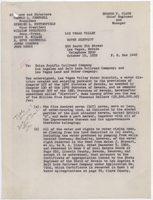
Draft offer of Las Vegas Valley Water District to purchase the water production lands and facilities of the Las Vegas Land and Water Company and the railroad, October 15, 1952
Date
Archival Collection
Description
Draft offer of Las Vegas Valley Water District to purchase the water production lands and facilities of the Las Vegas Land and Water Company and the railroad. R. L. Adamson's red pencil edits are handwritten. Accompanies letter (see Is referenced by). Draft has penciled corrections in the margins.
Text
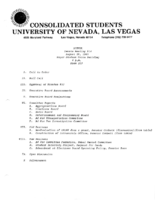
Meeting minutes for Consolidated Student Senate, University of Nevada, Las Vegas, August 19, 1980
Date
Archival Collection
Description
Text

